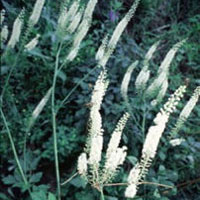Search Healthnotes
Black Cohosh
 © Steven Foster
© Steven FosterSide Effects
Black cohosh should not be used by pregnant or breast-feeding women.17 Very large amounts (over several grams daily) of this herb may cause abdominal pain, nausea, headaches, and dizziness.
There is one case report of a woman developing autoimmune hepatitis while using black cohosh.18 A cause–effect relationship is in doubt, however, because the hepatitis did not resolve after black cohosh was discontinued. A few cases have also been reported in which severe liver failure was attributed to the use of black cohosh.19 While a cause–effect relationship is difficult to prove, and while such a side effect appears to be rare, people taking black cohosh should be alert to signs of possible liver disease, such as nausea, loss of appetite, fatigue, and tan-colored urine. Black cohosh is not a substitute for hormone replacement therapy during menopause.
Copyright © 2024 TraceGains, Inc. All rights reserved.
Learn more about TraceGains, the company.
The information presented by TraceGains is for informational purposes only. It is based on scientific studies (human, animal, or in vitro), clinical experience, or traditional usage as cited in each article. The results reported may not necessarily occur in all individuals. Self-treatment is not recommended for life-threatening conditions that require medical treatment under a doctor's care. For many of the conditions discussed, treatment with prescription or over the counter medication is also available. Consult your doctor, practitioner, and/or pharmacist for any health problem and before using any supplements or before making any changes in prescribed medications. Information expires December 2024.











